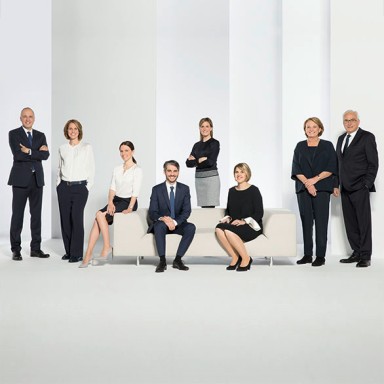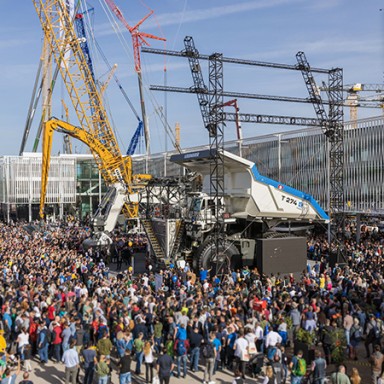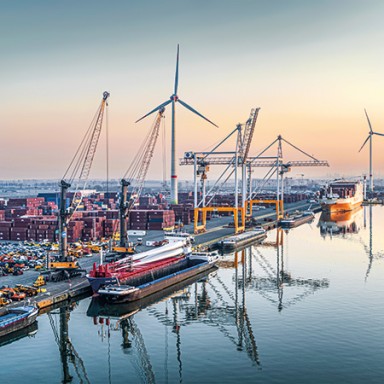Annual report 2022
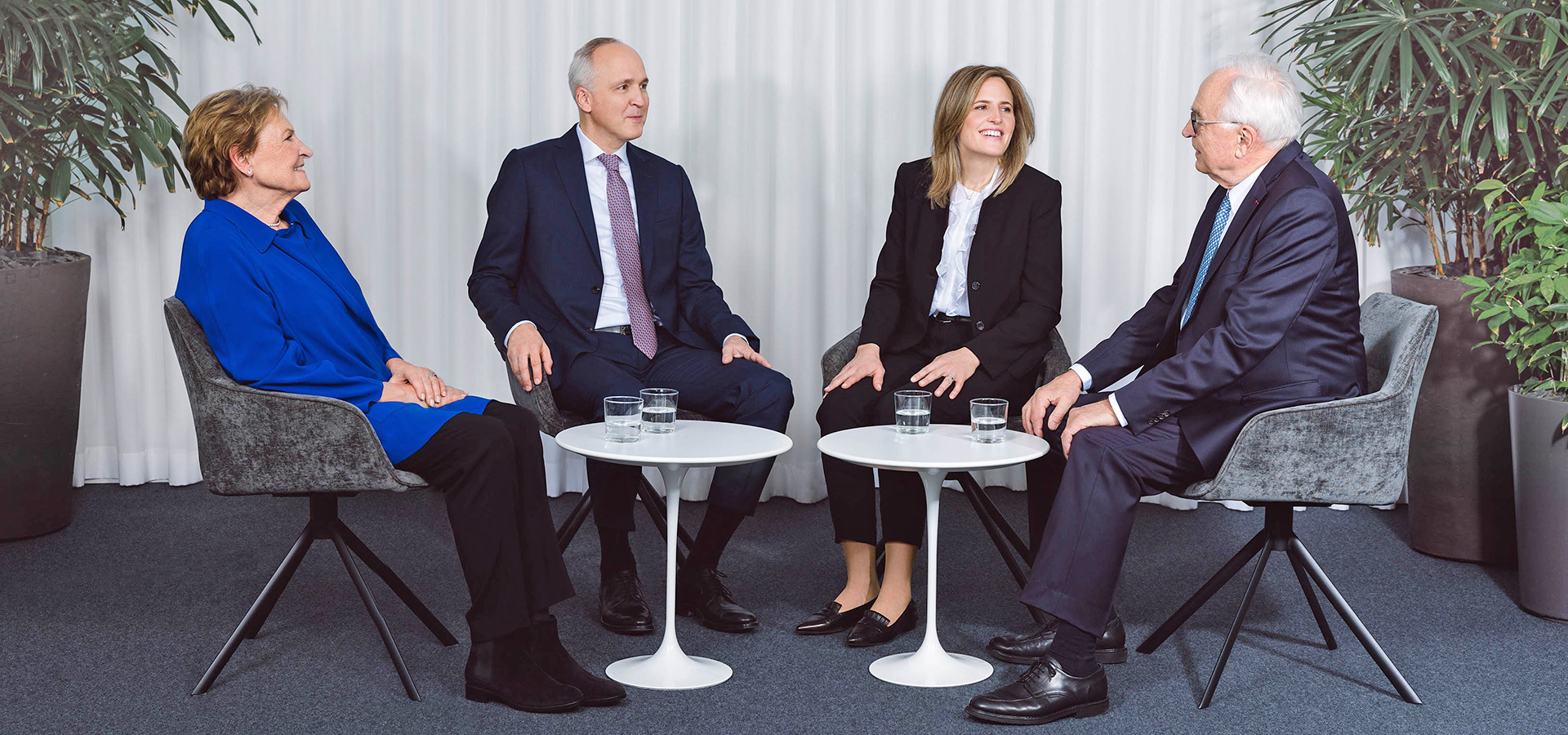
8 minutes reading time
Interview with the family shareholders
A conversation with Dr. h.c. Isolde Liebherr, vice president of the administrative board of Liebherr-International AG until 31 March 2023, Dr. h.c. Willi Liebherr, president of the administrative board of Liebherr-International AG until 31 March 2023, Patricia Rüf, member of the administrative board of Liebherr-International AG, and Jan Liebherr, incoming president of the administrative board of Liebherr-International AG from 1 April 2023.
Isolde and Willi Liebherr, you have resigned from your positions as vice president and president of the administrative board of Liebherr-International AG, effective end of March 2023. Does this mean that you’re now leaving the Liebherr Group and entering retirement?
Willi Liebherr: My sister and I will continue to be members of the administrative board, so we won’t be leaving the company. Nevertheless, with the replacement of my son Jan and my niece Stéfanie in the presiding committee, we have taken another step towards a generational change in the company’s management.
Isolde Liebherr: As long-standing members of the administrative board, all representatives of the third generation have a great deal of experience in managing our Group. We transferred shares in Liebherr-International AG to them back in 2012. Since then, they have managed various areas of the Group alongside us. The presiding committee of the administrative board is elected every three years. We thought that this year’s election was the right time to make a new appointment to the presiding committee.
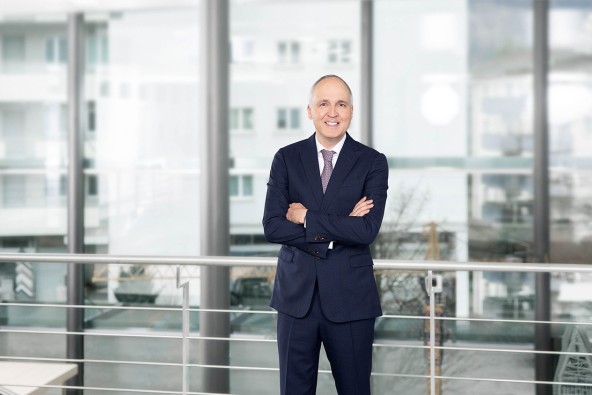
Mr Liebherr, what does this change mean for the Liebherr Group and for its customers and partners?
Jan Liebherr: We’ve simply taken another step towards the gradual transfer of responsibility from the second to the third generation of this family-run company. This process has been underway for several years. With my cousin and me as the presiding committee of the administrative board as well as the other representatives of the third generation, we guarantee continuity in the management of the company. We will continue to manage our Group as an independent family-run company based on longstanding values. Long-term orientation, responsible conduct, sound management, pronounced customer focus and immense technological expertise continue to be key factors in our success, and that’s not going to change in the future.
Let’s take a look back at 2022. How did the 2022 business year measure up?
Willi Liebherr: We’ve come through a very eventful year, shaped both by the effects of the coronavirus pandemic and the war in Ukraine. We remain deeply saddened by the situation there. Unfortunately, our initial hopes for an immediate end to the hostilities and Russia withdrawing from Ukraine were dashed. Our deepest sympathy goes out to the people of Ukraine and the many refugees who had to leave their homes. This crisis has not only claimed countless lives and created the need for massive humanitarian aid, but has also left a deep mark on the global economy. The existing bottlenecks and uncertainties surrounding global supply chains and the procurement of materials were exacerbated by the war. Added to this were sharp increases in raw material and energy prices, high inflation rates and further increases in material and transport costs.
Patricia Rüf: Nevertheless, looking back, we can also report on some positive developments. We experienced very high demand for our products, and turnover reached a new record level by the end of the year. Following the many restrictions due to the pandemic, we were finally able to travel and hold face-to-face meetings with our customers again. In 2022, we made tremendous progress with our technologies and solutions, and invested heavily in them once again.
How did the individual product segments fare in the 2022 business year?
Isolde Liebherr: We achieved an increase in turnover in almost all product segments. This growth would certainly have been even greater with a stable supply chain. Order intake was at a very high level. It is very gratifying to note that the aerospace sector has recovered faster than originally forecast.
Were there any specific developments in individual sales markets?
Patricia Rüf: We’ve seen exceptional growth in the regions of North America, Central and South America, and Africa, Near and Middle East. Individual markets that performed particularly well were Italy, the Netherlands, Switzerland, Turkey and the United Kingdom. Of course, the situation in Russia was an exception to all that.
Why has Liebherr not yet pulled out of the Russian market entirely?
Willi Liebherr: First of all, I’d like to reiterate that we condemn the Russian aggression against Ukraine and support the sanctions imposed on Russia. We stopped all investment in Russia last year and have almost completely ceased our production activities there. Of course, we haven’t supplied any sanctioned Russian companies or individuals with products of the Group.
However, we have not completely withdrawn from Russia because we still believe it is right to distinguish between those responsible for this war on the Russian side and Russian citizens in general. Neither our local customers nor our employees bear any personal responsibility for the war in Ukraine. We came to this decision because it allowed us to honour our existing contracts under the sanctions and avoid claims for damages based on existing delivery commitments. We have also fulfilled our duty of care towards our Russian colleagues and have prevented them from potentially being targeted by repressive measures in Russia. When the EU announced its 10th package of sanctions against Russia at the end of February 2023, the situation changed again significantly. We have suspended shipments to Russia of products covered by the extended sanctions.
The operating result has declined. What’s the reason for this?
Jan Liebherr: One underlying reason was the scarcity of materials over the course of the year, which made it difficult to complete our products. On top of that, procurement costs have risen significantly. Both had an impact on our operating result. This was already apparent at the beginning of 2022, which is why we were not surprised by the decline.
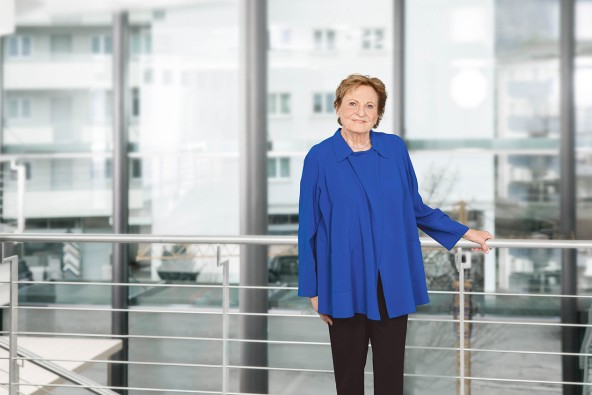
How are you counteracting the increase in costs?
Isolde Liebherr: The extreme turbulence over the past two to three years has unsettled the markets and market players. This has thrown the market off-balance. The extreme price fluctuations of recent years should be seen in that light. Together with our long-standing partners – including customers and suppliers – we will endeavour to restore things to a certain degree of normality. This also means that material costs, which have risen far out of proportion in some cases, will have to be brought back to a reasonable level.
How is the Group responding to rising interest rates and the weak euro?
Willi Liebherr: Rising interest rates affect both interest expenditure and interest income. To a certain extent, one offsets the other for us. At the same time, we have concluded long-term fixed interest rates for our financing, and thus secured interest rates and the same low levels as in recent years.
Jan Liebherr: The Group has to contend with almost constant currency fluctuations, but the resulting risks are mitigated by an established exchange rate management process. We have increasingly used what we saw as favourable euro and US dollar rates for hedging purposes.
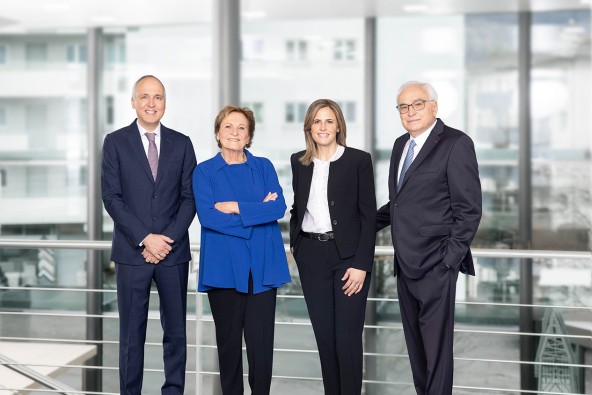
With all the challenges, let us not forget the pleasant things. Can you tell us some of your personal highlights from the past year?
Jan Liebherr: The major highlight was, of course, the Bauma exhibition going ahead and proving to be a massive success. We were the largest exhibitor there, with a great many innovations and future-oriented developments, so we were able to make a big statement. Once again, we were able to demonstrate our technological leadership in many different areas.
Patricia Rüf: It was a very special experience, with an atmosphere of noticeably positive energy from day one. And, of course, it was nice to meet up with so many employees and customers in person again after such a long time.
Willi Liebherr: A special highlight for me was our new crawler excavator R 9XX H2, which is equipped with a prototype hydrogen combustion engine and which won the Bauma Innovation Award in the climate protection category. Or the presentation of our T 274 mining truck with trolley system, which saves fuel and also CO2.
Jan Liebherr: To remain with the topic of mining, in the middle of the year we entered into a partnership with Fortescue Metals Group Ltd for the development and supply of mining trucks with zero-emission drive systems. These enable our customers to take one more step towards decarbonisation. That was also a special milestone for me.
Isolde Liebherr: For me, one of the top highlights was a world premiere for our refrigerators and freezers. Our new BluRoX technology makes us the only manufacturer to use an insulation vacuum in conjunction with perlite, a finely ground lava rock with very low thermal conductivity.
Willi Liebherr: And we achieved yet another milestone in the aerospace sector, with an order for the first complex component to be manufactured using 3D printing technology: the lower cargo door valve for the Airbus A350 fleet.
Patricia Rüf: I was particularly impressed when I saw the Heavy Lift Crane 295000, the largest crane that Liebherr has ever built, in operation for the first time. Here we have demonstrated what happens when people work closely together with an overarching goal in mind. Right away, our team went to extraordinary efforts to successfully install this heavy-duty crane on the installation vessel Orion. The nice thing is that this crane is also making a significant contribution towards the energy transition, because it’s primarily used for setting up wind turbines and dismantling oil platforms.
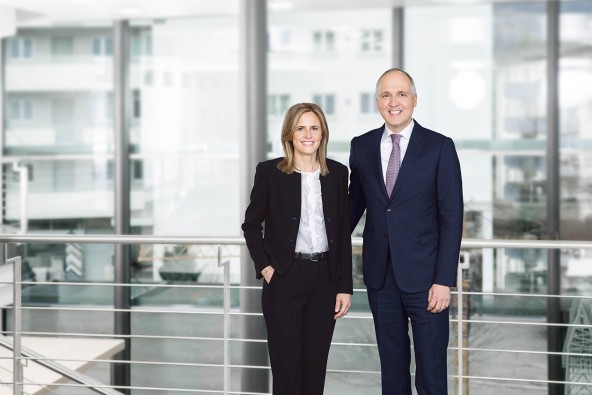
You’ve already mentioned some new products and technological developments. Has there been any progress in terms of digitalisation?
Jan Liebherr: We have expanded our digital product portfolio and consolidated our central development expertise. We want to offer our customers digital services that are precisely tailored to them. One example is our new product configurator for earthmoving and material handling machines, which opens the way for digitalised sales processes in these product segments.
Patricia Rüf: At the same time, we rolled out some assistance systems in mining, including the Trolley Guidance and Crusher Guidance solutions. These systems enable semi-autonomous steering of mining trucks, improve driver efficiency, increase operational safety and reduce fuel consumption and the risk of machine damage.
Meanwhile, the LICCON3 control system created a milestone for a new, digitised generation of mobile cranes. This optimised control system can handle all future requirements, so LICCON3 cranes are equipped for telematics and fleet management technology as standard.
The MyLiebherr customer portal has been given a fresh new design and several new features. Our team have focused on constantly enhancing ease of use and user-specific features like the fleet overview functions.
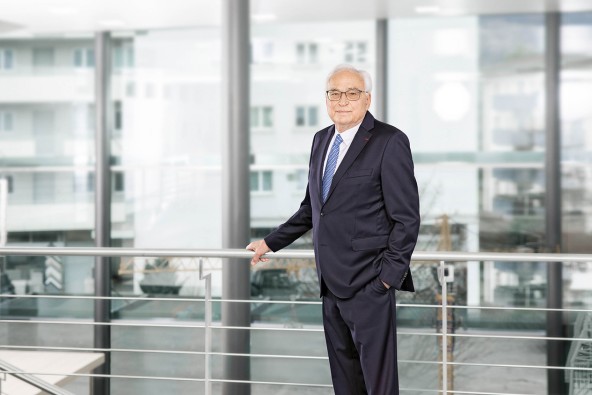
Alternative propulsion systems are another focus of research at Liebherr. You’ve chosen to pursue a technology-neutral approach. What milestones have been reached?
Patricia Rüf: Yes, we’re committed to a technology-neutral approach. We continue to rely on a wide range of technologies, such as electric motors, fuel cells, batteries, combustion engines and combined technology in the form of hybrid drive systems. Over the last year, we have made significant progress in the development of low-emission and zero-emission technologies, and have once again significantly expanded our product range.
Willi Liebherr: I have already mentioned our new crawler excavator R 9XX H2, which won the Bauma Innovation Award in the climate protection category. Another new addition is the LTC 1050-3.1E hybrid compact crane, which comes equipped with an electric motor along with the conventional drive system. Yet another example is our battery-powered unplugged range, which now features six new models for crawler cranes and piling and drilling rigs. Also worth mentioning is the Liduro Power Port, a mobile energy storage system that enables emissions-free on-site operation and charging of construction machines and systems with hybrid and fully electric drives.
Jan Liebherr: We’ve achieved further milestones with our first battery-electric wheel loader as well as with our battery-electric and hybrid-electric telescopic handlers. It’s worth mentioning that the heterogeneous application range of our products, different infrastructures and local environmental restrictions rule out a low-emission standard drive system. The size of a machine and its running time are also key factors. We firmly believe that a machine’s drive technology should be optimally matched to the area and region where it will be used to secure the greatest added value for our customers and ensure climate neutrality. Again, this illustrates the need for different drive technologies.
These technology initiatives can only be implemented with highly skilled employees. How are you dealing with the current shortage of skilled workers?
Isolde Liebherr: Traditionally, the Group relies heavily on its own training programme and on established advanced training schemes. This has worked very well so far. On top of that, we are constantly developing our Group-wide talent management programme to support employees who show high potential to develop specialist and management careers. We are constantly working to increase our attractiveness as an employer and offer our employees a modern working environment. At the same time, we are increasingly having to extend our search for personnel to areas outside the immediate vicinity of our sites.
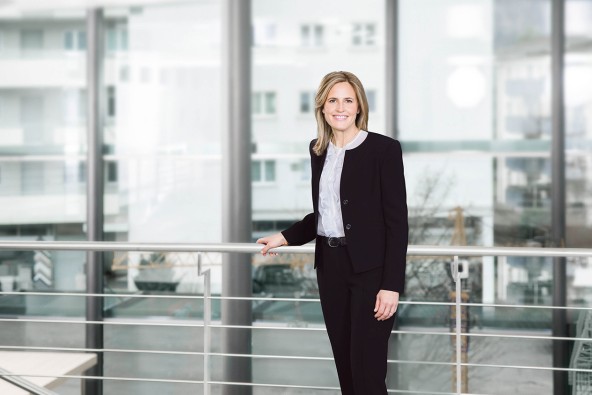
What were your investment priorities in 2022, and what was the strategy behind them?
Patricia Rüf: Shaping technological progress remains an ongoing objective for us. We have demonstrated that again this year, if you look at what we have achieved in research and development – especially when it comes to alternative drive systems and digitalisation. Again, this required enormous investments.
Isolde Liebherr: We’ve also invested in modernising our plants and in ensuring our proximity to our markets. We need to have a local presence if we are to offer our customers the very best service. That’s why we’ve invested in our sales and service companies in France and Austria. At the moment, we’re also expanding our capacity at certain sites. Construction work has begun on a new hydraulic cylinder plant in Oberopfingen (Germany) and we’re planning to enlarge our sites in Toulouse (France) and Pune (India). Last but not least, we decided to carry out extensive construction work on the Löwen Hotel Montafon in Schruns (Austria) which now offers guests even more space and comfort.
Jan Liebherr: Optimising our production processes was also a very important topic during the last year. At our Ehingen site in Germany, we pushed ahead with the development of the logistics plant and invested in restructuring our material flows. The new repair centre has already enhanced our range of services and provided new capacity. Further measures are planned for Ehingen up until 2024.
We were glad to see construction get underway for the new logistics centre at the Liebherr site in Telfs (Austria). Once it’s completed in mid-2023, we’ll store most of our production materials there, which will make logistics much easier.
Finally, let’s take a look at the current business year. What are your predictions for 2023?
Jan Liebherr: The general conditions that we mentioned are still causing uncertainty and putting a strain on the global economy. It’s difficult to make accurate predictions at this point in time, as things very much depend on global political development over the course of the year. Nevertheless, we began 2023 with a high order backlog and expect further growth in turnover.
Patricia Rüf: Generally speaking, there are plenty of opportunities for us this year. Just think of the energy transition and all the new opportunities and areas of business it is generating. This business year, we’re once again engaging with this topic through our ongoing research into alternative drive systems and the advancement of existing technologies. We’ve taken the right path for the sake of future generations, and we’re already making good progress. We’re sure that we’ll reach many more milestones this year. We’re feeling optimistic about the rest of the year and are already looking forward to the Group’s upcoming anniversary in 2024.
Thank you very much for sharing your thoughts.
This interview was conducted in March 2023.

